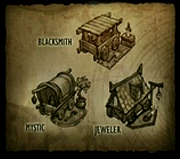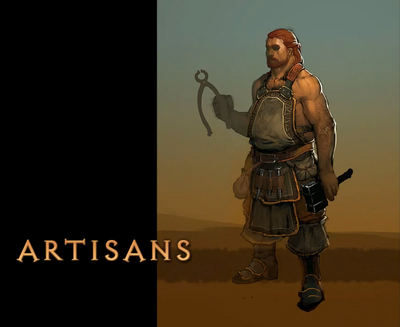Drudenfusz (talk | contribs) mNo edit summary |
|||
| (41 intermediate revisions by 11 users not shown) | |||
| Line 1: | Line 1: | ||
[[Image:Artisans.png|400px|right]] |
[[Image:Artisans.png|400px|right]] |
||
| + | '''Artisans''' are a type of NPC that was first introduced in Diablo III. As players progress through the main quest line of the game, they will meet and obtain these Artisans. |
||
| − | + | Once an Artisan has joined the player, they will make camp at the nearest town, and will follow the player throughout the various acts. There are currently two different Artisans that the player will encounter throughout their journey: '''The Blacksmith''', and '''The Jeweler''' ('''The Mystic''' was removed during development).<ref>http://us.battle.net/d3/en/blog/4325959/Systems_Changes-1_19_2012#blog</ref> The two Artisans will offer you various services as well as gossip and dialogue. Each Artisan possesses different specialties, and the services that each offers are defined by those individual talents. |
|
| + | __TOC__ |
||
| ⚫ | |||
| − | == |
+ | == Artisans == |
{| |
{| |
||
| + | | [[Image:Blacksmith.jpg|200px|The Blacksmith|link=Blacksmith]] |
||
| − | |- valign="top" |
||
| − | |[[Image: |
+ | | [[Image:Jeweler.jpg|200px|The Jeweler|link=Jeweler]] |
| ⚫ | |||
| − | |The '''Blacksmith''' sells and crafts weapons and armor that will most likely cater to melee classes: plate mail, chain mail, shields, swords, axes, etc. The Blacksmith's wagon will feature a rough, sharp aesthetic made up of wood and metal. He will also offer a few extra services: |
||
| + | ! [[Blacksmith]] |
||
| − | |||
| ⚫ | |||
| − | * '''Repair''': Can repair items. The Blacksmith is probably the only Artisan who will provide this service. Since it would be very strange if the player could not repair his items early in the game, it is reasonable to assume that the Blacksmith will become available to the player early on. |
||
| + | |- style="vertical-align: top;" |
||
| − | * '''Socketing''': Can add sockets to items which do not have sockets. Sockets can be added to items of any quality, whether they are magical, rare, set, legendary, or crafted. However, only certain item slots will be able to hold sockets. Gems can be inserted into sockets, providing the player with increased customization of their items. |
||
| + | |<nowiki></nowiki> |
||
| − | |[[File:Socketing_ig_link.png|thumb|right|The Blacksmith's Socketing UI]] |
||
| + | * Crafts weapons and armor |
||
| ⚫ | |||
| + | * Salvages items |
||
| − | <br style="clear:both" /> |
||
| + | |<nowiki></nowiki> |
||
| − | |||
| + | * Combines gems |
||
| − | == The Mystic == |
||
| + | * Removes gems |
||
| − | {| |
||
| − | |- valign="top" |
||
| − | |[[Image:Mystic.jpg|200px|left|The Mystic]] |
||
| − | |The '''Mystic''' sells and crafts items that will be used by the caster classes, such as staves and wands, and can probably create some magical armor as well. They also create scrolls, [[Runestones]], charms, and potions. The Mystic also provides the unique Enchanting service for your character and will Identify items. The Mystic's wagon will be rounded with natural, organic shapes. |
||
| − | |||
| − | * [[Enchantments|Enchanting]]: The Mystic is able to Enchant the player's weapons to deal additional damage. Currently, the only known enchants add elemental damage, along with certain related effects, to the weapons. However, it seems logical to assume that there will be a vast array of available Enchants that will appeal to all player classes. |
||
| − | |[[File:Weapon Enchants (Diablo III).jpg|thumb|right|Axes enchanted with Frost and Lightning, as seen in the original gameplay trailer from Blizzcon'08]] |
||
| ⚫ | |||
| − | <br style="clear:both" /> |
||
| − | |||
| ⚫ | |||
| − | {| |
||
| − | |- valign="top" |
||
| − | |[[Image:Jeweler.jpg|200px|left|The Jeweler]] |
||
| − | |The '''Jeweler''' deals in precious jewelry; namely amulets, rings, and [[gems]]. The Jeweler's wagon boasts an especially ornate look, as his jewels are more difficult to display than the other Artisans' goods. The Jeweler will provide the player with special services involving gems: |
||
| − | |||
| − | * '''Remove Gems''': The Jeweler can remove gems already socketed into items without destroying them, allowing the player to not only reuse gems, but to upgrade the gems socketed in their items as well. |
||
| − | * '''Combine Gems''': Unlike in [[Diablo II]], where gems were combined with the {{2|Horadric Cube}}, the Jeweler will combine the gems for the player in Diablo III. There are 14 quality levels of gems in Diablo III, and only the lowest five will be dropped from monsters. Therefore, it is up to the Jeweler to combine these gems to provide the player with the highest quality gems. |
||
|} |
|} |
||
| − | <br style="clear:both" /> |
||
==Leveling== |
==Leveling== |
||
[[File:Artisan Wagons Concept.png|thumb|right|Concept art for the Artisans' wagons]] |
[[File:Artisan Wagons Concept.png|thumb|right|Concept art for the Artisans' wagons]] |
||
| − | + | Artisans can be leveled up as a part of training, which firstly costs only gold and later also [[Page of Training|Pages of Training]]. As an Artisan is trained, he will gain the ability to craft more items of increasing power. Furthermore their increased prowess will also be reflected by a visual change to the Artisan's shop. There's no need to choose which artisan to develop or focus on. Given enough time, both can be developed fully. Artisans will be optional to use; if the player doesn't want to craft, there's no need to. The only exception to this rule is gems of tier 6 or greater, as the highest tiers of gems are only obtainable through crafting. Crafting merely provides the player with another venue through which they can acquire or upgrade items. |
|
| − | The level of the Artisan is retained across all characters. |
+ | The level of the Artisan is retained across all characters. Whenever you unlock an artisan for one character, it will be available for all your future characters on the same level and with the same recipes from the start of the game.<ref>http://www.diablofans.com/topic/28137-cool-little-details</ref> Artisans are however separate for Softcore and Hardcore modes. |
| ⚫ | |||
| − | |||
| ⚫ | |||
| − | The materials needed for crafting will be acquired primarily through [[salvaging]]. Items that the player finds but has no use for can be salvaged and converted into raw materials that can be provided to the Artisans for use in crafting. The crafting materials will take up much less space in the player's inventory than the items themselves, and will be stackable, thereby reducing the frequency that a player will need to return to town to clear out his inventory. Once an item has been salvaged, it will be destroyed and is not capable of being obtained again. Salvaging will be made possible by an artifact called the [[Nephalem Cube]] that players will come across while proceeding along the main storyline.<ref>http://forums.battle.net/thread.html?topicId=27810241169&pageNo=4#64</ref> |
||
| − | |||
| − | The variety of crafting materials obtained through salvaging is currently unknown, though at least four could be seen in the crafting system trailer. In general, higher-quality items will provide you with more valuable and rarer salvage than lower-quality items -- but the rarest materials are always found in treasure chests or beside the corpses of your foes. It has been stated that lower quality materials will not be required for high level crafting. Therefore, in order to level your Artisans' skills, you will be required to progress your character into the higher difficulties of the game as well. |
||
| + | === Total Leveling Costs === |
||
| − | {|style="margin: 0 auto; text-align: center; width: 400px" cellpadding="6" |
||
| + | {| class="dftable dfborder" cellpadding="2" |
||
| − | |[[Image:Crafting Sulfur.png|center|alt=Common Scraps]] |
||
| + | ! Artisan |
||
| − | |[[Image:Crafting Spirit.png|center|alt=Subtle Essence]] |
||
| + | ! Gold |
||
| − | |[[Image:Crafting Bone.png|alt=Bone|center]] |
||
| + | ! [[Pages of Training|Pages of Training]] |
||
|- |
|- |
||
| + | | [[Blacksmith]] || style="text-align: right;" | 311,000 {{g}} || style="text-align: right;" | 1 {{iconlink|Death's Breath|<nowiki></nowiki>}} [[Death's Breath]] |
||
| − | |Common Scraps |
||
| ⚫ | |||
| − | |Subtle Essence |
||
| + | | [[Jeweler]] || style="text-align: right;" | 416,000 {{g}} || style="text-align: right;" | 1 {{iconlink|Death's Breath|<nowiki></nowiki>}} [[Death's Breath]] |
||
| − | |Bone |
||
|} |
|} |
||
| + | |||
| ⚫ | |||
==Recipes== |
==Recipes== |
||
| + | {{See also|Category:Diablo III Recipes}} |
||
There are two means by which Artisans will be able to learn new crafting recipes: leveling and drops. The higher a particular Artisan's skill is, the more recipes they will be able to provide. In addition to this, many of the best recipes in the game will be obtained as random world drops from monsters, which can then be taken to the Artisan to learn. Crafted items will feature a number of pre-set bonuses, but will also come with a variety of random bonuses when created. Lead game designer Jay Wilson has said that the crafting system is a sort of evolution and combination of several systems present in Diablo II, namely runewords and gambling. |
There are two means by which Artisans will be able to learn new crafting recipes: leveling and drops. The higher a particular Artisan's skill is, the more recipes they will be able to provide. In addition to this, many of the best recipes in the game will be obtained as random world drops from monsters, which can then be taken to the Artisan to learn. Crafted items will feature a number of pre-set bonuses, but will also come with a variety of random bonuses when created. Lead game designer Jay Wilson has said that the crafting system is a sort of evolution and combination of several systems present in Diablo II, namely runewords and gambling. |
||
| Line 69: | Line 52: | ||
image:Training_ig.png |
image:Training_ig.png |
||
image:Salvage_ig_link.png |
image:Salvage_ig_link.png |
||
| − | image:Mats.png |
||
</gallery> |
</gallery> |
||
| − | |||
| − | |||
| − | {{#ev:youtube|oQpvYK_zs_Q}} |
||
==References== |
==References== |
||
Latest revision as of 20:03, 9 July 2017
Artisans are a type of NPC that was first introduced in Diablo III. As players progress through the main quest line of the game, they will meet and obtain these Artisans. Once an Artisan has joined the player, they will make camp at the nearest town, and will follow the player throughout the various acts. There are currently two different Artisans that the player will encounter throughout their journey: The Blacksmith, and The Jeweler (The Mystic was removed during development).[1] The two Artisans will offer you various services as well as gossip and dialogue. Each Artisan possesses different specialties, and the services that each offers are defined by those individual talents.
Artisans

|

|
| Blacksmith | Jeweler |
|---|---|
|
|
Leveling

Concept art for the Artisans' wagons
Artisans can be leveled up as a part of training, which firstly costs only gold and later also Pages of Training. As an Artisan is trained, he will gain the ability to craft more items of increasing power. Furthermore their increased prowess will also be reflected by a visual change to the Artisan's shop. There's no need to choose which artisan to develop or focus on. Given enough time, both can be developed fully. Artisans will be optional to use; if the player doesn't want to craft, there's no need to. The only exception to this rule is gems of tier 6 or greater, as the highest tiers of gems are only obtainable through crafting. Crafting merely provides the player with another venue through which they can acquire or upgrade items.
The level of the Artisan is retained across all characters. Whenever you unlock an artisan for one character, it will be available for all your future characters on the same level and with the same recipes from the start of the game.[2] Artisans are however separate for Softcore and Hardcore modes.
Total Leveling Costs
| Artisan | Gold | Pages of Training |
|---|---|---|
| Blacksmith | 311,000 |
1 |
| Jeweler | 416,000 |
1 |
Crafting Materials
The materials needed for crafting will be acquired primarily through salvaging. Items that the player finds but has no use for can be salvaged and converted into raw materials that can be provided to the Artisans for use in crafting. The crafting materials will take up much less space in the player's inventory than the items themselves, and will be stackable, thereby reducing the frequency that a player will need to return to town to clear out his inventory. Once an item has been salvaged, it is destroyed indefinitely. Salvaging was made capable by the Nephalem Cube but that was changed in development to a service offered by the Blacksmith.[3][4]
In general, higher-quality items will provide more valuable and rarer salvage than lower-quality items. Only magical items (blue) or higher are salvageable. Below is a list of the currently known crafting materials for each difficulty level which can be found.
Currently used Crafting Materials in Diablo III
Recipes
- See also: Category:Diablo III Recipes
There are two means by which Artisans will be able to learn new crafting recipes: leveling and drops. The higher a particular Artisan's skill is, the more recipes they will be able to provide. In addition to this, many of the best recipes in the game will be obtained as random world drops from monsters, which can then be taken to the Artisan to learn. Crafted items will feature a number of pre-set bonuses, but will also come with a variety of random bonuses when created. Lead game designer Jay Wilson has said that the crafting system is a sort of evolution and combination of several systems present in Diablo II, namely runewords and gambling.


















